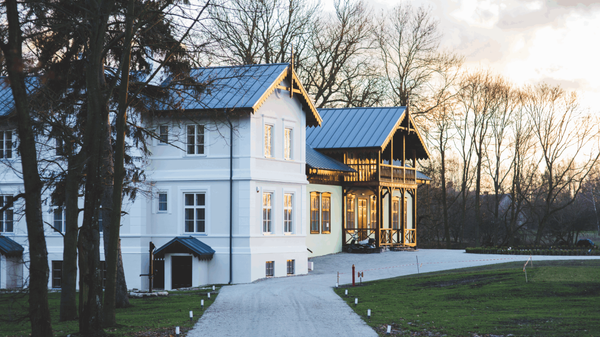2024 Real Estate Forecast: Top 6 Trends You Can't Afford to Miss

As we enter 2024, the real estate industry is going through significant changes. Technology and the global economy play a big role in shaping how things are turning out. It's crucial for business owners to stay informed and take action to keep up with the latest trends in real estate.
Even though we can't predict the future, we can observe current trends and make educated guesses about where things are headed. Being aware of these possibilities is key for landlords, estate agents, and investors to succeed in the evolving real estate landscape.
Now, let's take a closer look at some important trends that will impact the real estate market in 2024. Understanding and adapting to these trends will be very beneficial for business owners facing the challenges in the real estate industry this year.
1. More People Embracing Co-living and Working Anywhere
This shift in lifestyle preferences is reshaping the landscape of the real estate market, with an increasing number of people prioritizing flexibility and communal living. Millennials, in particular, are driving this change, seeking living arrangements that align with their dynamic work styles and desire for social connection. The rise of co-living spaces and the acceptance of working from anywhere indicate a departure from the traditional notion of separated living and working spheres.
Real estate entrepreneurs who recognize and respond to this trend have an opportunity to cater to the evolving needs of the market. Properties designed to accommodate both living and working needs are poised to become sought-after commodities, reflecting a modern approach that acknowledges the blurring lines between personal and professional spaces. As the demand for such flexible arrangements continues to grow, savvy entrepreneurs can position themselves at the forefront of this evolving real estate landscape, meeting the expectations of a demographic increasingly valuing adaptability and communal experiences.
2. Technology on Property Development
This technological transformation in property development not only enhances the efficiency of construction but also addresses the growing demand for sustainable and technologically advanced living spaces. Smart homes, equipped with innovative technologies like automation and connectivity, offer residents greater convenience and energy efficiency. As artificial intelligence becomes more integrated into the building process, it has the potential to optimize construction methods, resulting in cost-effective and environmentally friendly outcomes. Embracing these advancements allows real estate business owners to stay ahead in meeting the evolving preferences of homebuyers who increasingly seek modern, eco-friendly, and tech-savvy homes.
3. Going Green and Sustainable Living in the Spotlight
The emphasis on green and sustainable living within the real estate sector reflects a broader societal shift towards environmental consciousness. As we enter 2024, there is a growing awareness of the impact that traditional construction practices can have on the planet. This heightened awareness is prompting a surge in interest and demand for eco-friendly methods in real estate development. Developers who prioritize sustainability are not only contributing positively to the environment but are also strategically aligning themselves with the evolving preferences of a consumer base increasingly committed to eco-friendly lifestyles.
In the coming year, the focus on sustainability is expected to extend beyond energy-saving measures to encompass a holistic approach to eco-friendly construction. This includes the use of recycled materials, efficient waste management, and the implementation of innovative green technologies. As businesses in real estate adopt these practices, they not only meet the expectations of environmentally conscious consumers but also position themselves as leaders in responsible and forward-thinking development. The integration of sustainable practices not only benefits the planet but also enhances the market appeal of properties, creating a win-win scenario for both developers and environmentally conscious homebuyers.
4. Inflation's Ripple Effect on Property Values
During periods of high inflation, the value of money decreases, making it important for people to find ways to safeguard their wealth. Real estate becomes an attractive option because, unlike money, property tends to hold its value better during inflation. As individuals seek to protect their financial well-being, they may choose to invest more in real estate, anticipating that property values will rise over time. This increased demand for real estate, driven by the desire to preserve wealth, can contribute to higher property prices in an inflationary environment.
5. Building Homes Faster and Smarter with Modular Housing
Modular housing involves constructing homes using pre-made sections or modules that are manufactured off-site and then assembled at the construction site. This innovative approach helps overcome challenges commonly associated with traditional homebuilding, such as unpredictable weather conditions and time-consuming on-site construction. By utilizing prefabricated components, the construction process is significantly faster, allowing for quicker occupancy of the homes.
Moreover, the streamlined process of modular construction often results in cost savings. The efficiency gains come from the controlled environment of the factory, where modules are produced, reducing waste and optimizing resource utilization. This cost-effectiveness makes modular housing an appealing option for developers looking to maximize their budget and offer affordable housing solutions. Additionally, the environmental sustainability associated with modular construction aligns with the increasing emphasis on eco-friendly building practices, making it a choice that resonates with environmentally conscious homebuyers.
6. Blockchain Changing How Homes Are Bought and Sold
Blockchain's impact on real estate transactions is like having a secure and tamper-proof digital ledger for all property dealings. This technology ensures that information about a property is trustworthy and cannot be easily altered, providing a higher level of security and transparency. Smart contracts, a feature of blockchain, work like self-executing agreements, automating and simplifying the process of transferring property ownership without the usual complexities involved with intermediaries. Real estate entrepreneurs exploring blockchain can look forward to a more efficient system that not only reduces the chances of fraud but also streamlines the overall buying and selling experience for everyone involved in the transaction.
As we look ahead, paying attention to these market trends is really important. Whether you're someone who invests in real estate, works as a real estate agent, or owns a home, knowing and dealing with these trends can be a game-changer. As things in the real estate world keep changing, it's smart to be open to new ideas and match what people want in homes nowadays. This way, you set yourself up for success in the 2024 real estate market. Don't overlook these trends – they're like a guide showing where real estate is headed.
Categories
Recent Posts











